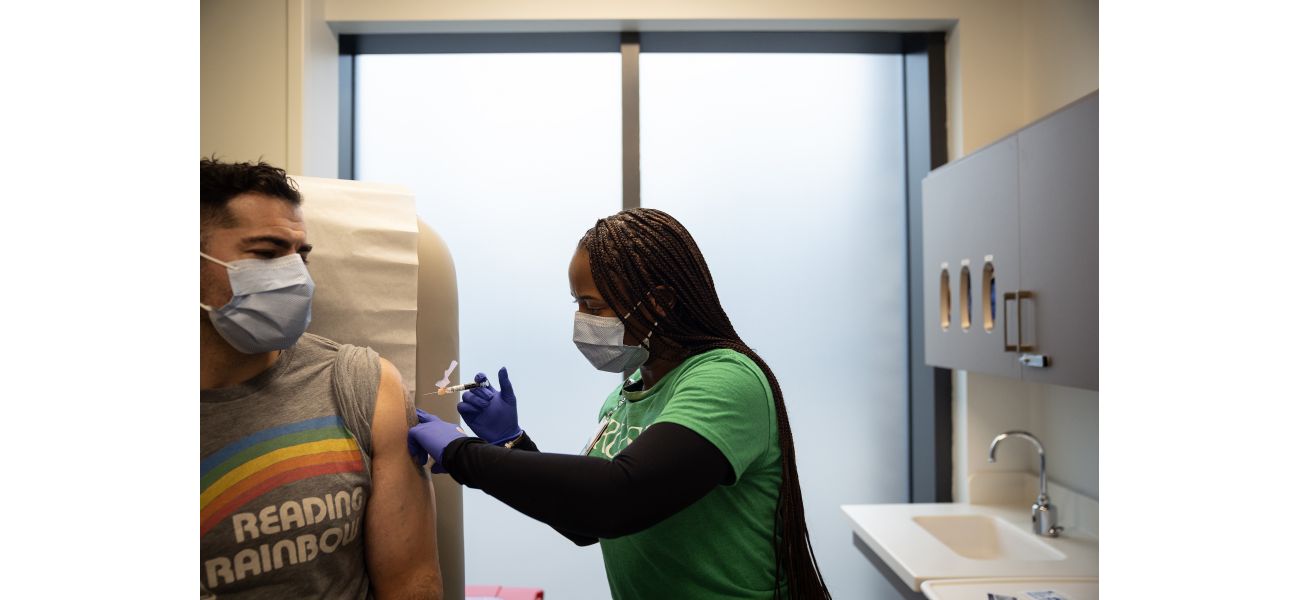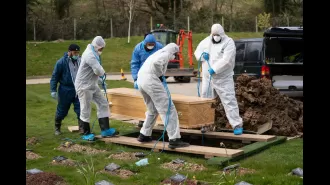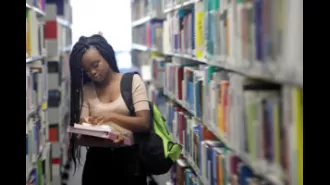Chicago is currently experiencing a rise in cases of both the flu and RSV, as well as a stomach bug to be aware of.
Chicago residents have been affected by RSV and the flu during recent celebrations, while COVID rates are also rising.
December 31st 2024.

Leslee Cohen-Lavin and her family were in good spirits as the holidays approached. However, things took a turn for the worse when they all fell ill during their winter break. Cohen-Lavin's 5-year-old daughter developed a fever and body aches, and lost her appetite. Shortly after, Cohen-Lavin herself came down with a fever that lasted for days. Finally, her husband caught what seemed like a common cold. As a result, the family had to cancel most of their holiday plans.
Despite the setback, Cohen-Lavin remains grateful that their illness wasn't more serious and that they are now on the road to recovery. Unfortunately, their experience is not uncommon in the Chicagoland area during this time of year. Along with the holiday season, it is also the peak season for respiratory viruses and stomach bugs.
As residents of Chicago have been enjoying festive activities over the past few weeks, various illnesses have been spreading. Flu cases are rapidly increasing, RSV cases are at a high level, and there is a slight increase in COVID-19 cases according to a recent report from the Chicago Department of Public Health. The state of Illinois has also seen a rise in positive tests for the flu and RSV, as well as emergency room visits for these illnesses.
Nationwide, norovirus outbreaks, which cause symptoms such as vomiting and diarrhea, have also been on the rise. The Illinois Department of Public Health is currently investigating reported outbreaks, but initial data shows that cases are slightly higher than pre-pandemic levels. Dr. Laura Zimmermann, a primary care doctor at Rush University System for Health, can attest to the spread of these viruses as she recently battled a severe viral illness herself.
Despite these concerning trends, Dr. Zimmermann assures that there is no need to panic as this is a typical occurrence during the cold and flu season. To help prevent the spread of these illnesses, the Illinois Department of Public Health has recommended that all healthcare facilities implement facility-wide masking. Dr. Aniruddha Hazra from UChicago Medicine also emphasizes the importance of wearing masks in patient areas to protect vulnerable individuals.
Currently, RSV and the flu are among the most prevalent respiratory illnesses in Chicago. The test positivity rate for the flu is at 11.2%, up from just 2.6% two weeks ago. Emergency room visits for the flu have also increased from 0.5% to 2.8%. However, it is worth noting that these numbers are still lower than they were a year ago and during a severe flu season two years ago.
Dr. Jonathan Pinsky, medical director for infection control at Endeavor Health Edward Hospital, believes that the flu has not yet peaked but is not as widespread as in previous years. On the other hand, RSV seems to be more prevalent this season compared to the previous year, but not as severe as two years ago when children's hospitals in the area were filled with RSV patients. RSV typically causes mild symptoms, but can be more severe in babies and older adults. Lurie Children's Hospital has seen 23 children hospitalized with RSV, with half of them in the intensive care unit.
In Chicago, the test positivity rate for RSV is at nearly 15%, compared to 8.5% last year. Similarly, 1.3% of emergency room visits are for RSV, compared to 0.8% last year. At the state level, the test positivity rate for RSV is at 13.5%, up from 10.6% two weeks ago. It is clear that respiratory illnesses are widespread in the Chicagoland area, but healthcare professionals are working diligently to keep patients safe and prevent further spread.
Leslee Cohen-Lavin and her family were looking forward to a peaceful holiday season. But as fate would have it, they were hit with a wave of illnesses just as their break began. Cohen-Lavin, who lives in Highland Park, shared how it all started with her 5-year-old daughter developing a fever, body aches, and loss of appetite. Soon after, Cohen-Lavin herself fell ill with a prolonged fever. And to top it off, her husband caught a head cold. As a result, they had to cancel most of their plans for the winter break. Despite the challenges, Cohen-Lavin is grateful that her family is now on the mend.
Unfortunately, the Cohen-Lavin family is not alone in their struggles. Many families in the Chicagoland area are facing a similar situation. This time of year is not only known for the holiday season but also for the increase in respiratory viruses and stomach bugs. As people have been celebrating and enjoying festivities, various illnesses have taken hold. Reports from the Chicago Department of Public Health show that flu activity is rapidly increasing, RSV activity is at a high level, and even COVID-19 activity, though low, is on the rise. These trends are also reflected statewide, with more positive tests for the flu and RSV, as well as an increase in emergency department visits for these illnesses.
The national picture is not any better, with a rise in norovirus outbreaks that cause vomiting and diarrhea. In Illinois, the state health department is closely monitoring reports of these outbreaks, although they seem to be slightly higher than before the pandemic. Dr. Laura Zimmermann, a primary care doctor and chief of general internal medicine at Rush University System for Health, confirms that there is a wide range of viruses currently circulating. In fact, she herself just recovered from a severe viral illness that left her with a fever, cough, congestion, and a sore throat. However, she reassures that there is no need to panic, as this is just a typical cold and flu season.
Given the increase in respiratory illnesses, the Illinois Department of Public Health has recommended that health care facilities implement facility-wide masking. This is a precautionary measure to protect patients, as stated by Dr. Aniruddha Hazra, an associate professor of medicine at UChicago Medicine. Other local health care systems have also followed suit, requiring everyone to wear masks in patient areas. Currently, RSV and the flu are the most prevalent respiratory illnesses in Chicago, according to the Chicago Department of Public Health.
Flu positivity rates in Chicago have risen from 2.6% to 11.2% in just two weeks, with 2.8% of emergency department visits being related to the flu. These numbers are higher than before but still lower than they were a year ago or two years ago during a particularly harsh flu season. Dr. Jonathan Pinsky, medical director for infection control at Endeavor Health Edward Hospital, confirms that the numbers are not as alarming as they were during the previous season, although the flu has not yet reached its peak. On the other hand, RSV seems to be more widespread this year compared to the previous year, although not as severe as two years ago when it filled children's hospitals in the Chicago area. RSV typically causes mild symptoms, but it can be severe for babies and older adults. At Lurie Children's Hospital, 23 children have been hospitalized with RSV, with about half of them in the intensive care unit, according to Dr. Larry Kociolek.
Overall, the situation may seem daunting, but it's important to remember that these respiratory viruses and stomach bugs are common during this time of the year. With proper precautions and medical care, many people are able to recover from these illnesses. So, while it may be a tough break for some, it could always be worse. As we navigate through this season, let's remember to take care of ourselves and each other.
Despite the setback, Cohen-Lavin remains grateful that their illness wasn't more serious and that they are now on the road to recovery. Unfortunately, their experience is not uncommon in the Chicagoland area during this time of year. Along with the holiday season, it is also the peak season for respiratory viruses and stomach bugs.
As residents of Chicago have been enjoying festive activities over the past few weeks, various illnesses have been spreading. Flu cases are rapidly increasing, RSV cases are at a high level, and there is a slight increase in COVID-19 cases according to a recent report from the Chicago Department of Public Health. The state of Illinois has also seen a rise in positive tests for the flu and RSV, as well as emergency room visits for these illnesses.
Nationwide, norovirus outbreaks, which cause symptoms such as vomiting and diarrhea, have also been on the rise. The Illinois Department of Public Health is currently investigating reported outbreaks, but initial data shows that cases are slightly higher than pre-pandemic levels. Dr. Laura Zimmermann, a primary care doctor at Rush University System for Health, can attest to the spread of these viruses as she recently battled a severe viral illness herself.
Despite these concerning trends, Dr. Zimmermann assures that there is no need to panic as this is a typical occurrence during the cold and flu season. To help prevent the spread of these illnesses, the Illinois Department of Public Health has recommended that all healthcare facilities implement facility-wide masking. Dr. Aniruddha Hazra from UChicago Medicine also emphasizes the importance of wearing masks in patient areas to protect vulnerable individuals.
Currently, RSV and the flu are among the most prevalent respiratory illnesses in Chicago. The test positivity rate for the flu is at 11.2%, up from just 2.6% two weeks ago. Emergency room visits for the flu have also increased from 0.5% to 2.8%. However, it is worth noting that these numbers are still lower than they were a year ago and during a severe flu season two years ago.
Dr. Jonathan Pinsky, medical director for infection control at Endeavor Health Edward Hospital, believes that the flu has not yet peaked but is not as widespread as in previous years. On the other hand, RSV seems to be more prevalent this season compared to the previous year, but not as severe as two years ago when children's hospitals in the area were filled with RSV patients. RSV typically causes mild symptoms, but can be more severe in babies and older adults. Lurie Children's Hospital has seen 23 children hospitalized with RSV, with half of them in the intensive care unit.
In Chicago, the test positivity rate for RSV is at nearly 15%, compared to 8.5% last year. Similarly, 1.3% of emergency room visits are for RSV, compared to 0.8% last year. At the state level, the test positivity rate for RSV is at 13.5%, up from 10.6% two weeks ago. It is clear that respiratory illnesses are widespread in the Chicagoland area, but healthcare professionals are working diligently to keep patients safe and prevent further spread.
Leslee Cohen-Lavin and her family were looking forward to a peaceful holiday season. But as fate would have it, they were hit with a wave of illnesses just as their break began. Cohen-Lavin, who lives in Highland Park, shared how it all started with her 5-year-old daughter developing a fever, body aches, and loss of appetite. Soon after, Cohen-Lavin herself fell ill with a prolonged fever. And to top it off, her husband caught a head cold. As a result, they had to cancel most of their plans for the winter break. Despite the challenges, Cohen-Lavin is grateful that her family is now on the mend.
Unfortunately, the Cohen-Lavin family is not alone in their struggles. Many families in the Chicagoland area are facing a similar situation. This time of year is not only known for the holiday season but also for the increase in respiratory viruses and stomach bugs. As people have been celebrating and enjoying festivities, various illnesses have taken hold. Reports from the Chicago Department of Public Health show that flu activity is rapidly increasing, RSV activity is at a high level, and even COVID-19 activity, though low, is on the rise. These trends are also reflected statewide, with more positive tests for the flu and RSV, as well as an increase in emergency department visits for these illnesses.
The national picture is not any better, with a rise in norovirus outbreaks that cause vomiting and diarrhea. In Illinois, the state health department is closely monitoring reports of these outbreaks, although they seem to be slightly higher than before the pandemic. Dr. Laura Zimmermann, a primary care doctor and chief of general internal medicine at Rush University System for Health, confirms that there is a wide range of viruses currently circulating. In fact, she herself just recovered from a severe viral illness that left her with a fever, cough, congestion, and a sore throat. However, she reassures that there is no need to panic, as this is just a typical cold and flu season.
Given the increase in respiratory illnesses, the Illinois Department of Public Health has recommended that health care facilities implement facility-wide masking. This is a precautionary measure to protect patients, as stated by Dr. Aniruddha Hazra, an associate professor of medicine at UChicago Medicine. Other local health care systems have also followed suit, requiring everyone to wear masks in patient areas. Currently, RSV and the flu are the most prevalent respiratory illnesses in Chicago, according to the Chicago Department of Public Health.
Flu positivity rates in Chicago have risen from 2.6% to 11.2% in just two weeks, with 2.8% of emergency department visits being related to the flu. These numbers are higher than before but still lower than they were a year ago or two years ago during a particularly harsh flu season. Dr. Jonathan Pinsky, medical director for infection control at Endeavor Health Edward Hospital, confirms that the numbers are not as alarming as they were during the previous season, although the flu has not yet reached its peak. On the other hand, RSV seems to be more widespread this year compared to the previous year, although not as severe as two years ago when it filled children's hospitals in the Chicago area. RSV typically causes mild symptoms, but it can be severe for babies and older adults. At Lurie Children's Hospital, 23 children have been hospitalized with RSV, with about half of them in the intensive care unit, according to Dr. Larry Kociolek.
Overall, the situation may seem daunting, but it's important to remember that these respiratory viruses and stomach bugs are common during this time of the year. With proper precautions and medical care, many people are able to recover from these illnesses. So, while it may be a tough break for some, it could always be worse. As we navigate through this season, let's remember to take care of ourselves and each other.
[This article has been trending online recently and has been generated with AI. Your feed is customized.]
[Generative AI is experimental.]
0
0
Submit Comment





